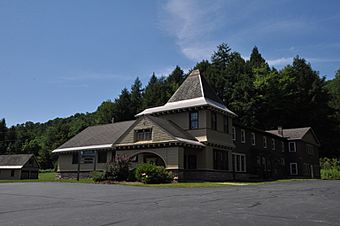St. Johnsbury Federal Fish Culture Station facts for kids
Quick facts for kids |
|
|
St. Johnsbury Federal Fish Culture Station
|
|
 |
|
| Location | 374 Emerson Falls Rd., St. Johnsbury, Vermont |
|---|---|
| Area | 12.2 acres (4.9 ha) |
| Built | 1895 |
| Architect | von Bayer, Hector; Packard, Lambert |
| Architectural style | Shingle Style, Colonial Revival |
| MPS | Fish Culture Resources of Vermont MPS |
| NRHP reference No. | 05000189 |
| Added to NRHP | March 18, 2005 |
The St. Johnsbury Federal Fish Hatchery was a special place in St. Johnsbury, Vermont. It was a fish hatchery, which means it was a farm for fish! The U.S. government paid for it.
From 1895 to 1960, this hatchery raised fish. These fish were then released into rivers like the Connecticut River and St. Lawrence River. This helped keep fish populations healthy in northern New England and New York. Today, the old buildings are used for other things. They are also listed on the National Register of Historic Places. This means they are important historical sites.
Contents
History of the Fish Hatchery
Why Was It Built?
The St. Johnsbury Federal Fish Hatchery was created by a special law in 1891. Its main goal was to help increase the number of lake trout and salmon. These fish were needed in the smaller rivers that flow into the Connecticut and St. Lawrence Rivers. This included parts of northern New England and New York.
The perfect spot was chosen in St. Johnsbury, Vermont. It was on the west side of the Sleepers River. The hatchery started raising fish in 1895. The property had rights to use water from the river. It also had a fresh spring, but over time, this spring didn't provide enough water.
Why It Closed
The hatchery almost closed in 1934 because of money problems. But it stayed open thanks to a deal between the federal and state governments.
However, new problems came up. The Sleepers River water got too warm in the summer. This was bad for fish that needed colder water. Also, the cold-water springs still didn't have enough water. Because of these issues, the decision was made to close the hatchery in 1959. It stopped raising fish in 1960 and was sold to private owners in 1961.
Most of the old fish ponds have been filled in. But some of the underground pipes are still there. The old dam, about half a mile upriver, also remains. The main buildings were fixed up in 2001 and 2002. Now, they are used for other purposes.
What's Left Today?
The old hatchery buildings are about 2.5 miles northwest of downtown St. Johnsbury. They are located between the Sleepers River and Route 2. You can find them just north of where Route 2 meets Interstate 91. They are at the south end of Emerson Falls Road.
The Main Building
The main hatchery building is a beautiful example of Shingle style architecture. It was designed by Herbert Von Bayer. He was an architect who worked for the U.S. Fish and Wildlife Service.
This building has two stories. It has a cool, pointy tower (called a pyramidal turret) on one corner. Next to it is a covered entrance for cars, called a porte-cochere.
Other Buildings and Features
Near the main building is the old home of the superintendent. This house was built in 1898. It was designed by a local architect named Lambert Packard. Behind the house, there's a carriage barn from around 1900.
The land around the buildings still shows signs of the hatchery. There are filled-in or partly-filled ponds. These were used to control how water flowed through the facility. You can also find some of the old underground pipes.



